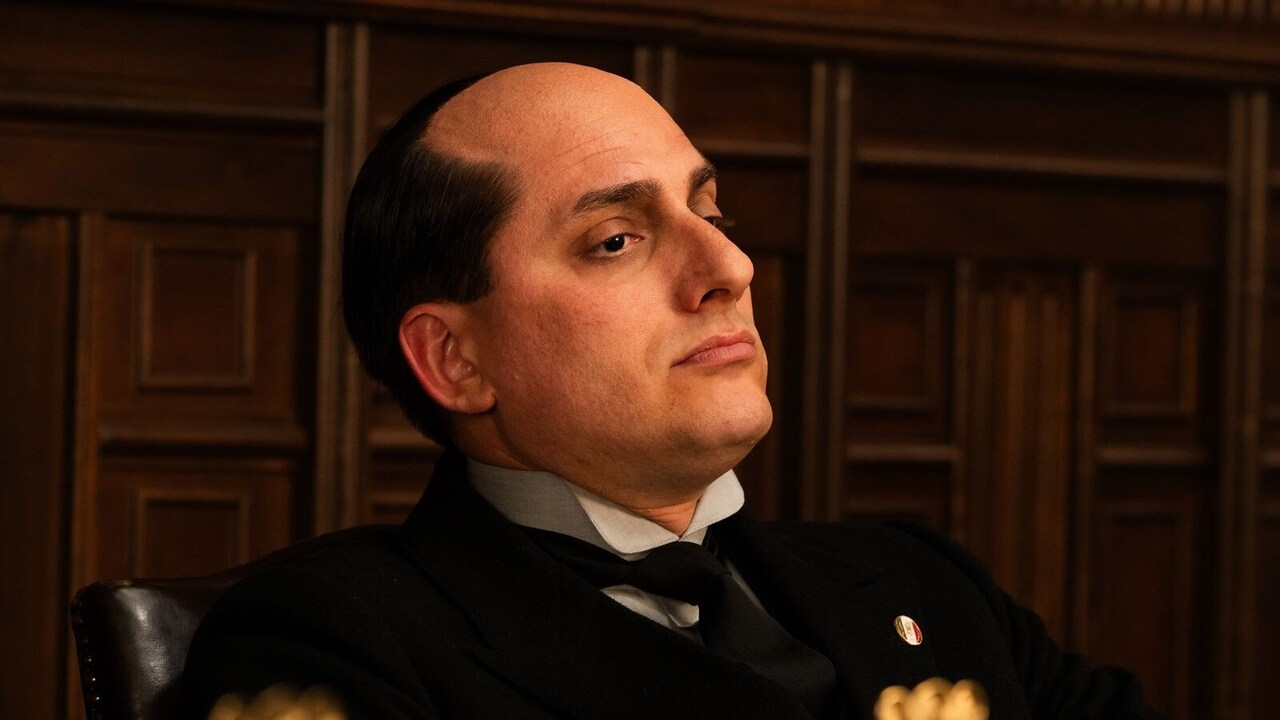
If I had to describe Joe Wright's movies, I would refer to them as "cinema of embellishments." In Hanna, Wright threw us into a dizzying state during the action scenes. He filmed Anna Karenina like a stage play, and in The Woman in the Window, he displayed some of his best work as a filmmaker with disorienting camera movements (the movie, unfortunately, fell apart after an hour). Oh, let's not forget something like Pan. Its opening scenes seem to unfold in space, but then a figure runs over water, and we are instantly brought down to the earthly plane. What's more, Cyrano and Darkest Hour have their grand sets, while Pride & Prejudice and Atonement have grand passions. Wright, in other words, likes his films big, beautiful, and even ostentatious. Sometimes the style enhances the substance (The Woman in the Window). Sometimes the style is all that remains (Darkest Hour, Cyrano, Pan). In Mussolini: Son of the Century, Wright takes us close to a fascist figure with a style that definitely adds to the substance. His Benito Mussolini, played by Luca Marinelli, not only calls fascism a "beautiful creature" but also invites us to follow him on his journey. This Benito is a confident buffoon with plenty of sexual appetite. He knows how to galvanize his followers and maintain a poised appearance before his enemies. We, the viewers, can see the cracks in his façade because we remain too close to him. This fourth-wall-breaking, proud fascist delivers his plans, his fears, his confessions to us directly.
Wright could have said yes to Mussolini because of his political consciousness or moral duty. Yet, the director never sits down to preach. He shows the dangers of fascism and how stupid the power-hungry leaders can be away from the eyes of the public by turning us into a sort of confidante of the titular dictator, the "son of the century." Benito, at one point, confesses to the fragility of his plan, and he introduces his opponents by mocking their personalities. Sometimes, his taunts carry suggestions of jealousy (see how he calls Gabriele D'Annunzio [Paolo Pierobon] "poet, flying ace, war hero" — a superman), which are very much amusing. In Wright's hands, Benito becomes a mad clown. He's both pompous and puerile, a man of family and a man of a mistress, an ambitious dreamer and a scared idiot. At the 1st Fasces of Combat Convention in Florence, Benito arrives in a pilot's uniform and spins fiction before his wide-eyed supporters, like a joker performing a magic trick. After delivering another impassioned speech — impassioned only to his followers — at a theater in Naples, Benito struts through the streets like an imperious honcho, only to have his inflated self-image undercut by a carriage driver who calls him "a piece of shit."
Wright, like that carriage driver, constantly undermines Benito's sense of self-importance. Near the beginning of the first episode, Benito, who bears an eerie resemblance to Colin Farrell's Penguin, asks you to follow him and asserts that you will not only fall in love with him, but also convert yourself into a fascist. This is precisely what doesn't happen throughout the four episodes provided for review. Of course, this is not meant to happen anyway. Wright just wants to display the arrogance, the nerve with which (wannabe) dictators make claims and announcements. Wright also does something else. With Mussolini, he argues that dictators don't become dictators overnight. They don't gain the power to rule, abuse, and oppress by waving a magic wand or any other enchanted object. This progression, from diehard fascist to full-blown dictator, happens slowly, step by step. The blame lies with ordinary citizens who fail to see through the lies. It lies with the socialists who stop at sharp speeches. And it lies with the ruler — or any man in a position of power — who allows fascists to enter the parliament.
This tale of sex, impotence, and fascism is told through light yellow frames that do more than offer a mere "slight burning sensation." The yellow hue gives voice and vigor to debauchery and debased behavior. It "heats up" the scenes, making the characters' bodies appear drenched in sweat. This is why even sex is charged with eroticism. When Benito and Margherita Sarfatti (Barbara Chichiarelli) kiss, they almost eat one another. Benito refers to himself as an animal because, according to him, he can "smell the times ahead." But observe how he throws himself into sex — he resembles an animal in more ways than one. I was especially repelled by his orgasmic expressions; I wasn't sure what I hated more: his ideology or that face. Additionally, Wright employs tilted camera angles in some scenes to portray a world out of order. Does the director come across a bit literal-minded? Sure. However, the images nonetheless have an impact on the audience. Valerio Bonelli serves as an editor, providing the series with a pulsing momentum that echoes the rush and rapture of Benito's followers. Bonelli and Wright nearly turn Mussolini into a musical — a musical set at a rave party or nightclub. The song flows through the gliding camera work (Seamus McGarvey is the cinematographer) and the seamless, high-energy transitions. And the lyrics, you ask? Toxic masculinity, performed by men.
Final Score- [8/10]
Reviewed by - Vikas Yadav
Follow @vikasonorous on Twitter
Publisher at Midgard Times
Get all latest content delivered to your email a few times a month.
Bringing Pop Culture News from Every Realm, Get All the Latest Movie, TV News, Reviews & Trailers
Got Any questions? Drop an email to [email protected]